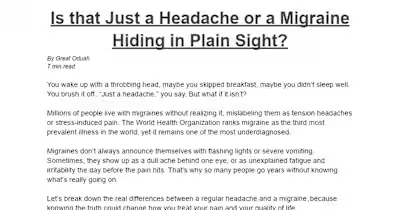Understanding PCOS: A Guide for Gen Z Women
PCOS – The Hormonal Mystery Messing with Gen Z Women
By Oduah Great
8 min read
You’re tired. Your skin’s breaking out again. Your periods are a mess. And no matter what you eat or how hard you try, your body doesn’t seem to play fair.
If this feels like your everyday reality, you’re not alone. More and more young women are discovering that their struggles aren’t just “in their heads” , that they could be signs of Polycystic Ovary Syndrome, better known as PCOS. It’s confusing, overwhelming, and often brushed off. But behind the acne, weight gain, and mood swings is a real hormonal condition that deserves to be seen and understood.
This article breaks down what PCOS is, why it’s so common among Gen Z women, and how to start taking back control , even when your body feels like a mystery.
Why is PCOS so common and so confusing young women?
Polycystic Ovary Syndrome (PCOS) affects an estimated 1 in 10 women of reproductive age, but many experts believe the number is even higher especially in younger generations due to underdiagnosis.
According to the CDC, PCOS is one of the most common causes of infertility, yet it remains misunderstood and often misdiagnosed. Part of the confusion comes from its wide range of symptoms, which can vary from person to person. You might be dealing with irregular periods, while someone else’s biggest struggle is acne, excessive hair growth, or stubborn weight gain.
On top of that, Gen Z women face a different kind of stress. The pressure to be constantly “on,” digitally present, and aesthetically perfect on social media makes symptoms like facial hair, cystic acne, and bloating feel extra personal. It’s not just about how you feel, it’s about how you’re perceived. That emotional load can make PCOS feel even heavier.
Then there’s the issue of self-diagnosing online. Thanks to TikTok, Reddit, and YouTube, more young women are hearing about PCOS than ever before. While that’s great for awareness, it also leads to a flood of confusing advice and pseudo-fixes that aren’t backed by science.
To make things worse, a lot of doctors still don’t take hormonal symptoms seriously, especially in younger patients. Many women report being dismissed for years, told to "just lose weight" or "wait and see" when they bring up irregular periods or fatigue.
Now, what actually causes PCOS?
At its core, PCOS is a hormonal disorder but the exact cause is complex and involves several factors working together.
First, many women with PCOS have higher levels of androgens, often called “male hormones,” even though all women have them. These extra androgens can cause symptoms like acne, excess hair growth (hirsutism), and hair thinning on the scalp. Think of it as your body producing too much of the hormones that normally exist in balance.
Second, insulin resistance plays a huge role. Insulin is the hormone that helps your body use sugar from food for energy. When your body doesn’t respond well to insulin, blood sugar stays high, which triggers your ovaries to produce more androgens, creating a vicious cycle. This is why many women with PCOS also struggle with weight gain or have a higher risk for type 2 diabetes.
Third, genetics can’t be ignored. PCOS tends to run in families, so if your mom or sister has it, your chances are higher too. Scientists are still working to identify the exact genes involved, but it’s clear that hereditary factors matter.
Lastly, lifestyle and environment can influence how PCOS shows up. Chronic stress, poor diet, and lack of exercise may worsen symptoms or trigger PCOS in women already genetically predisposed.
While the causes may seem complicated, knowing that PCOS is not your fault and involves real biological changes can be a huge relief. Understanding the hormonal roots also helps explain why it’s not just about weight or appearance, it’s a real health condition that deserves proper care.
The Symptoms of PCOS Every Woman Should Know
PCOS can show up in many different ways, which is part of why it’s so confusing. For some women, the first clue is irregular or missed periods. You might notice your cycle skipping months or suddenly becoming very heavy or unpredictable. This happens because PCOS affects how your ovaries release eggs, throwing off your natural rhythm.
Then there’s the issue of unwanted hair growth. Many women find themselves dealing with more hair than usual on their face, chest, or back, a condition called hirsutism caused by elevated male hormones. On the flip side, some notice thinning hair or even hair loss on their scalp, which can be equally upsetting.
Skin problems often come along for the ride. If you’re struggling with stubborn acne, especially cystic types around your jawline or chin that don’t clear up easily, PCOS could be behind it. Your skin might also be oilier than usual. Some women also develop darkened patches of thickened skin, usually around the neck or underarms, which can be a sign of insulin resistance.
Weight gain, especially around the belly, is another common complaint. Many women with PCOS find that despite their best efforts with diet and exercise, losing weight feels like an uphill battle, and that’s because insulin resistance can slow down metabolism.
It’s not just the physical symptoms either. Hormonal imbalances can leave you feeling drained or moody, contributing to fatigue, anxiety, or brain fog. These emotional and mental effects often get overlooked but can have a big impact on daily life.
Finally, PCOS can affect fertility. Because it disrupts ovulation, some women find it harder to get pregnant or may experience miscarriages. But it’s important to remember that many women with PCOS do conceive, often with the right medical support.
The tricky part? Not everyone experiences every symptom, and severity varies. But if you’re spotting several of these signs, it’s worth chatting with a healthcare provider to get some clarity.
Why getting diagnosed with PCOS isn’t always straightforward
One of the most frustrating things about PCOS is how long it can take to get a diagnosis. Many women go years and sometimes even a decade without knowing what’s really going on with their bodies. And it’s not because they aren’t paying attention; it’s often because PCOS doesn’t fit neatly into one box.
For starters, there’s no single test that screams “yep, that’s PCOS.” Instead, doctors usually rely on a combination of signs, symptoms, and lab tests. The most widely used standard is called the ‘Rotterdam criteria’, which says you need to meet at least two of the following three:
Irregular or absent periods (which means you’re not ovulating regularly)
High androgen levels, either shown through blood tests or visible symptoms like acne or excess hair
Polycystic ovaries on an ultrasound; meaning your ovaries have many small follicles that don’t mature properly
But here’s where things get tricky: not everyone with PCOS has cysts, and not everyone with cysts has PCOS. Some people might have regular periods but still experience other symptoms. Others might be dismissed because they “don’t look like” they have a hormone disorder.
Plus, symptoms like acne, fatigue, and weight gain are easy to brush off as just stress, puberty, or “normal.” Many doctors (and even patients themselves) chalk them up to lifestyle factors rather than digging deeper. That’s especially true if you’re not trying to get pregnant , fertility concerns often bring PCOS to light, but without them, it may stay hidden.
Bloodwork often includes tests for hormones like testosterone, LH, FSH, and insulin. An ultrasound may also be used to check your ovaries. But again, even with these tools, diagnosis requires careful consideration, not just ticking boxes.
The bottom line? If something feels off, you deserve to be heard. Whether you’re struggling with your period, skin, mood, or metabolism, it’s okay to ask your doctor about PCOS. Getting a diagnosis doesn’t mean something’s “wrong” with you, it means you finally have a name for what you’ve been experiencing, and that opens the door to understanding your body better.
Management & Treatment Options
Once you’ve gotten a diagnosis, the next question is: What now? The good news is, while PCOS isn’t something that just “goes away,” there are ways to manage it and no, it’s not about fixing everything overnight or chasing perfection.
Lifestyle changes are usually the first step, and not in the punishing, guilt-inducing way social media sometimes makes them feel. Small, sustainable changes to the way you eat, move, and care for yourself can make a real difference. For example:
Balanced meals that include protein, healthy fats, and complex carbs can help stabilize blood sugar and reduce insulin resistance, which is a big part of the PCOS puzzle.
Gentle movement like walking, strength training, or even yoga can help regulate hormones and ease symptoms like fatigue or mood swings.
Better sleep and stress management. Honestly, they matter more than most people think. PCOS can make you feel like your body’s working against you but rest helps it fight back.
Medications can also help, depending on your symptoms and goals. Birth control pills are often prescribed to regulate periods and reduce androgen-related symptoms like acne or excess hair. If insulin resistance is an issue, your doctor might suggest metformin. If fertility is a concern, ovulation-inducing medications could be on the table.
And remember, PCOS looks different for everyone. What works for your friend might not work for you and that’s okay. It’s not about doing things perfectly, it’s about finding what helps you feel more in control and more at home in your own body.
Finally, consider joining a supportive community or talking to a therapist who understands the emotional side of living with PCOS. Feeling confused, frustrated, or even angry about your symptoms is valid and you don’t have to carry it all alone.
You are not broken. You are learning your body, and that takes strength. One step at a time, you are healing and that’s enough.
For further details, see:
Thanks for reading, stay safe!
Like this project
Posted May 17, 2025
Article on PCOS, its symptoms, causes, and management for Gen Z women.
Likes
0
Views
0





